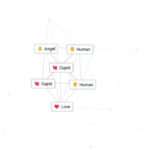Learning to express love in Arabic goes beyond simple translation; it unlocks deeper cultural understanding and connection. This guide explores various ways to say “I love you” and other affectionate phrases in Arabic, providing context and examples for each.
The Basics: “Love” and “I Love You” in Arabic
Let’s start with the foundation. The word for “love” in Arabic is حُب (hubb). To say “I love you,” you’ll use a verb conjugated based on the gender of the person you’re addressing:
| English | Transliteration | Arabic |
|---|---|---|
| I love you (m) | Bahibak | بحبَك |
| I love you (f) | Bahibik | بحبِك |
| I love you (pl) | Bahibokom | بحبكم |
The suffixes (-ak, -ik, -kom) are pronouns indicating you in masculine singular, feminine singular, and plural forms, respectively. To intensify your expression, add جدا (gedan), meaning “very much”: Bahibak gedan (بحبك جدا) – I love you very much.
Beyond “I Love You”: Terms of Endearment
Arabic is rich with terms of endearment, allowing for nuanced expressions of affection. Here are some popular choices:
Habibi/Habibti (حبيبي/حبيبتي)
Perhaps the most well-known Arabic endearment, habibi (حبيبي) for males and habibti (حبيبتي) for females translates to “my beloved.” It’s used in romantic contexts and also affectionately with family and close friends.
Hobbi (حبي) – My Love
Simply meaning “my love,” this term is derived from the word for love (hubb) with a possessive suffix.
Albi (قلبي) – My Heart
This translates to “my heart” and signifies deep affection.
Habib Albi/Habibit Albi (حبيب قلبي/حبيبة قلبي) – Beloved of My Heart
Combining “habibi/habibti” and “albi,” this phrase expresses profound love, translating to “beloved of my heart.”
Rouhi (روحي) – My Soul
Reserved for romantic relationships, this term of endearment means “my soul.”
Hayati (حياتي) – My Life
Similar to “Rouhi,” “Hayati” (“my life”) is used to express deep love and commitment in romantic relationships.
Omri (عمري) – My Lifetime
While literally translating to “my life,” “Omri” holds a deeper cultural significance, referring to the time spent alive and cherished. This term is often used in songs and poetry to express profound love and connection.
Assal/Sokkar (عسل/سكر) – Honey/Sugar
These terms describe someone as sweet and charming, often in a playful and lighthearted way. They can be used platonically but calling someone “ya assal” directly implies flirtation.
Qamar (قمر) – Moon
Referring to someone as “qamar” (“moon”) compliments their beauty, particularly a woman’s. It’s a common expression of admiration.
Ghali/Ghalia (غالي/غالية) – Precious
Meaning “precious,” these terms highlight someone’s value and importance in your life.
Gamil/Gamila (جميل/جميلة) – Beautiful
While literally meaning “beautiful,” these adjectives can also describe inner beauty and kindness, particularly when referring to men. For women, it usually refers to physical beauty unless context suggests otherwise.
Ayouni/Nour El Ain (عيوني/نور العين) – My Eyes/Light of the Eye
“Ayouni” (“my eyes”) signifies willingness to do anything for someone. “Nour El Ain” (“light of the eye”) further emphasizes their preciousness.
El Hetta El Shemal (فى الحتة الشمال) – In the Left Side (of My Chest)
A contemporary informal expression, this phrase refers to someone holding a special place in your heart, literally residing on the left side of your chest where the heart is located.
Wahashtini/Wahashtiini (وحشتني/وحشتيني) – I Missed You
Expressing the feeling of longing, these phrases translate to “I missed you,” highlighting the emptiness felt in someone’s absence.
Kont(y) fi Bali (كنت فى بالي/كنتي فى بالي) – You Were on My Mind
These phrases convey that someone was in your thoughts. A simpler alternative is “Kont bafakkar feek/ki” (كنت بفكر فيك/فيكي) – “I was thinking about you.”
Bamoot Feek(i) (بموت فيك/بموت فيكي) – I Die in You
A dramatic expression of love, this phrase translates to “I die in you,” conveying overwhelming affection. It’s less common in younger generations.
Expressing Love in Arabic: A Cultural Journey
Learning these phrases provides a glimpse into the richness of Arabic culture and its expressive nature. From simple “I love you” to poetic declarations, Arabic offers a diverse vocabulary to communicate affection and build deeper connections.
